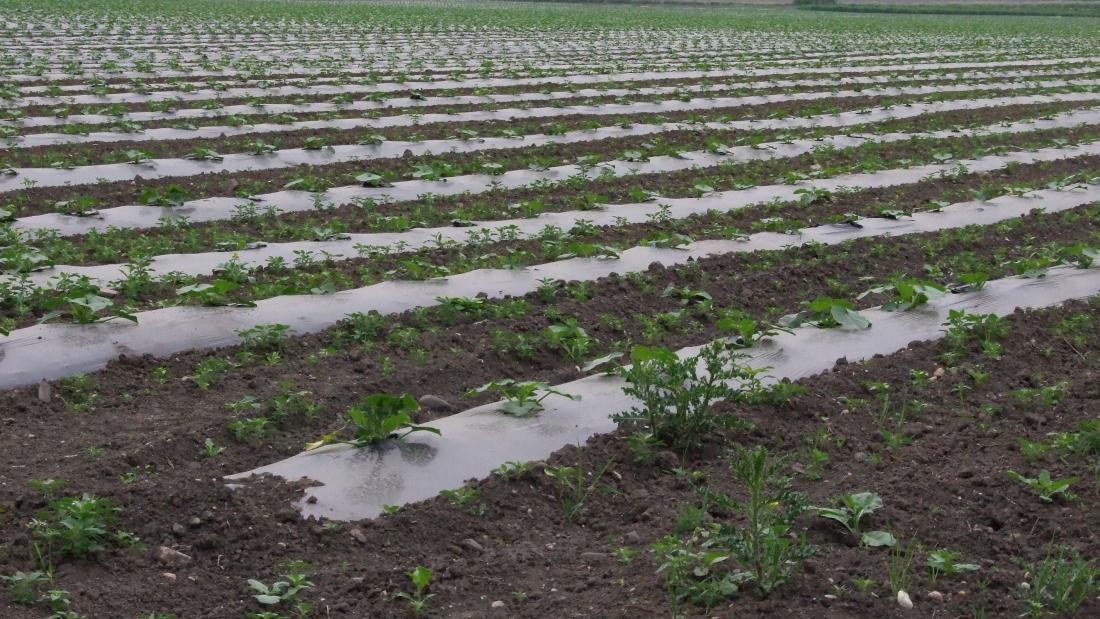Climate change is a much bigger threat to agriculture than plastic film mulch, researchers warn
Climate change is a much bigger threat to agriculture than plastic film mulches are, according to new research.
In fact, the Bangor University-led study found that plastic film mulching is helping to minimise the effects of many environmental problems in agriculture.
Mulching is an agricultural technique that involves covering the soil with special films to raise temperatures, suppress weeds and conserve water in crop production.
The research, published in Environment International, robustly challenges the growing concerns about agricultural plastic use while calling for better research and management practices.
Researchers from Bangor University, China Agricultural University, and other international institutions have published a comprehensive review examining the benefits and potential environmental impacts of plastic film mulching in agriculture.
They warn that their findings highlight a critical paradox that policymakers, farmers, and environmental advocates must address.
The project that underpins the paper was initiated via the UKRI Global Challenges Research Fund (GCRF) and the Natural Environment Research Council project.
Lead author Professor Davey Jones from Bangor University said, "Plastic film mulch has revolutionised agriculture in many regions of the world, feeding an additional 100 million people.
"So far we have found little evidence for damage to soil and crop health from agricultural plastics compared to other environmental threats such as climate change. Indeed, plastic film mulching is helping to minimise the effects of many problems in agriculture such as pesticide use, water shortages and overuse of fertilisers.”
Co-author Professor David Chadwick, also from Bangor University, adds, “Although there are concerns about microplastic pollution we can find little evidence of this on soil and crop health when present at typical concentrations. Whilst some organisations are calling for bans on plastics use, our view is that these can be addressed through better choice of plastic film mulches with their end-of-life in mind, rather than outright bans that could threaten food security."
The research shows that plastic film mulch delivers remarkable benefits:
These include increased crop yields by an average of 45.5% improved water use efficiency by 58%, and educed irrigation needs by approximately 50 million cubic meters annually.
They also include decreased herbicide use by preventing around 20,000 tons of chemical applications, and enhanced farmer incomes by £200-700 per hectare
These benefits directly contribute to multiple UN Sustainable Development Goals including zero hunger, reduced poverty, and responsible consumption.
The researchers also say that the environmental concerns about the use of plastic in agriculture need to be put context.
The study reveals that many concerns about microplastics are based on flawed research using unrealistically high plastic concentrations.
Dr. Kai Wang, co-author from China Agricultural University said, "Current research often tests microplastic levels that are hundreds or thousands of times higher than what we actually find in agricultural soils. At realistic concentrations that we have measured in soils following repeated use of plastic film mulches, the impact on soil health appears minimal."
The researchers found that typical microplastic levels in agricultural soils represent only about 0.0001% of total soil volume, far less than many laboratory studies have tested.
The study makes a number of recommendations for farmers and policymakers.
Rather than banning this valuable agricultural technology, the researchers recommend a focus on "zero-leakage" rather than "zero-use" approaches to minimise environmental impact, whilst a robust evidence base is established and improved film formulations are developed.
They advocate the use thicker, more durable plastics that resist fragmentation and are easier to recover. They also urge investment in mechanical removal equipment to maximise plastic film retrieval after use. There may also be a role for biodegradable plastic film mulches where retrieval and recycling are not possible.
The establishment of collection programs with incentives for proper disposal is recommended as is for biodegradable alternatives to be considered where economically feasible.
Dr Changrong Yan, co-author from the Chinese Academy of Agricultural Sciences said, "While biodegradable mulches show promise, their significantly higher costs, 2-3 times that of conventional mulch, present challenges for widespread adoption, especially for smallholder farmers.”
The paper outlines critical research needs, including standardised protocols for measuring microplastics in soil and realistic experiments that reflect actual field conditions.
"We need better science to make informed policy decisions," Professor Jones said. "Our global food security depends on getting this balance right."





